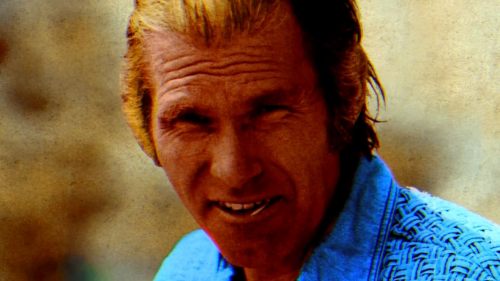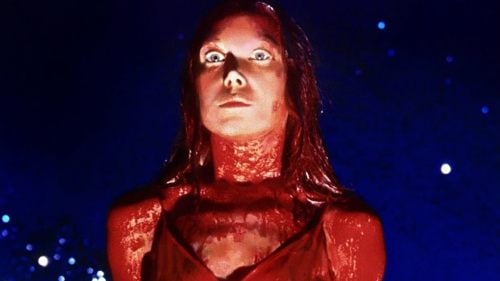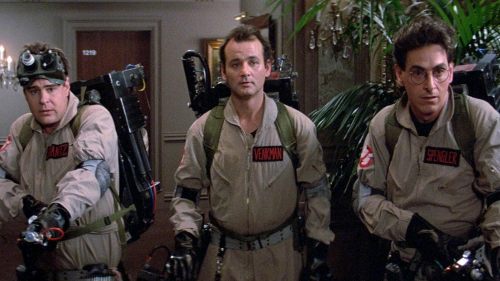Collins’ Crypt: Changing Stephen King’s Stories Can Be For The Better
On one of the bonus features on the Firestarter Blu-ray (in stores today from Scream Factory), director Mark Lester explains that he was not the first pick for the production, as John Carpenter was originally hired. This isn't news to most horror fans, but what got my eyebrow raised was Lester saying he was dropped from the project because the script Carpenter wrote (actually Bill Lancaster, Carpenter's The Thing writer) was almost completely different from the novel. The story has always gone that Carpenter was actually fired because The Thing tanked and Universal second guessed giving him another big budget genre film, so if this is the truth it's news to me. I was also under the impression that the Lancaster/Carpenter script was given a blessing by Stephen King himself, regardless of how closely it stuck to the book, so making changes seems like a weird reason to fire a guy if King wasn't complaining. Whatever the reason was, Carpenter got to make another King movie (Christine), and die-hard Firestarter fans got to see a movie that was, as King put it, "flavorless - like cafeteria mashed potatoes".
Like any film ever made, it has its fans (primarily on the strength of its Tangerine Dream score, I suspect), but even if I wasn't predisposed to side with Carpenter, I wouldn't be one of them, and it's for the exact reason King states. To the best of my memory, not a thing of note was changed (locations and the particular publication Charlie goes to at the end seem to be the biggest deviations), and I suspect that mechanically slavish devotion to the source material is the reason the film falls flat. Lester even admits his lack of fingerprints on the bonus features, saying his idea was that the producers paid money to acquire the book and therefore he should deliver exactly that. Even if the books was one King's best works (and no one seems to think it is), there are things that make sense for novels that don't work on film, and vice versa, and thus straight adaptations tend to flounder as a result. There are exceptions, of course (The Green Mile, though I don't think it's as good as Darabont's two other King adaptations, both of which made some changes), but film adaptations that stray from the original novel at least have some creative spark on display, giving the film a life of its own. Whether those impulses pay off or not is of course up for debate, but since the book will almost certainly be more fleshed out and detailed, I fail to see the point of trying to stick as close as you can to it. Sure, it might work fine for the folks who already read it, but those who didn't will feel a disconnect, perhaps only subconsciously, because the film's creators were copy pasting but removing some of the connective tissue, rendering the on-screen actions inadvertently weightless. The characters sometimes come off as pod people, because they're saying and doing things in a non-organic way, something that could be avoided if the filmmakers were serving the film, not the book that inspired it.
And that's why I've almost always felt that capturing the spirit of a text is far more important than replicating it down the last letter. When the screenwriter is freed from the confines of an existing work, they can let their own imagination take over, referring to the original as needed, or even spring-boarding away from it at a key juncture and never looking back. Sure, maybe these things won't work, but the key difference is that they will be designed with cinema in mind, which a novel wouldn't be (for the most part). They are different mediums, after all, and directly copying a book into a movie won't necessarily work any better than translating a concept album into a TV show. And again, this isn't King's best work, but at least on the page we'd get inside the characters' heads and get their unique POVs, whereas on-screen we just get the chase/fire scenes and try not to think about The Fury and Carrie the entire time. It's a serviceable enough thriller, but it never really comes to life the way the best of the movies based on his work have - and none of those followed his novel to the letter.

Of course, we don't need to use Firestarter as proof that going off book can yield better results - we have two movie versions of The Shining, and only very, very select few honestly claim that the "faithful" version (the TV movie written by King himself) is superior to the one that dared to make some changes. I mean, if you honestly think that the story falls apart because Kubrick changed a room number, or put in a hedge maze in lieu of topiary animals, then that's your cross to bear I guess. I do agree that Jack Nicholson's version of Jack Torrance seems crazy from the start, but I also agree that Kubrick wasn't interested in showing the guy's slow descent into madness, and thus it doesn't matter as much. King's novel served as an inspiration to make a very good Stanley Kubrick movie, and until 1997 we could wonder about a more direct translation and if it would improve things. Then we got our answer, and it was apparently "no", because while the miniseries version was indeed much more faithful to the novel, it was also tedious and not remotely scary. Admittedly, the characters - particularly Wendy - were more well rounded than in Kubrick's film, but it failed in a lot of the ways that I think are necessary for creating a solid movie, regardless if they got the room number right this time. To be fair, I don't think Kubrick's movie is a flawless masterpiece, but it's a damn good movie and, despite what King may say, one of the best movies to come from his ever-expanding library. The miniseries lands somewhere around the Children of the Corn sequels.
Now, is it possible to make a great (and the best) version of The Shining without making as many changes to the source material as Kubrick made? I'm sure it is, but 99% of the criticisms I've ever heard of Kubrick's film start "in the book...", and to me that's just irrelevant. King himself has quite famously said that the movies and books are separate things (the old, "they didn't ruin anything, they're right here on the shelf" quote), so I fail to see why we should dismiss the 1980 film on those grounds. If it was sloppily made, poorly acted, incoherent, and so on - sure, slam away. But someone putting their own stamp on the material is a rather silly reason to dislike it, I think, and if anyone's earned the right to make something his own, it's Stanley Kubrick. Plus it's not like he pulled a total 180; at the end of the day, both King's novel and Kubrick's film are about a family (Jack, Wendy, and their son Danny) being stuck in the Overlook hotel over the winter period, and encounter any number of horrors that spring up on account of the history of their own family and the hotel itself. The details can and should change depending on the medium as well as the reality of the situation (i.e. the reason there are no topiaries in the Kubrick film is because they were impossible to pull off in the pre-CGI days), and if you need everything to be filmed exactly as originally written, then you should just read the book again and use your imagination.
Don't get me wrong, you can certainly go too far. The makers of The Lawnmower Man discovered as much in 1992, when King actually sued to have his name removed from the film because it had almost zero to do with his original story, and didn't care much for the ads touting things like "From the mind of Stephen King!" when it wasn't anything even remotely like his idea. In fact, the script was already written beforehand, and the producers merely bought the story rights to use the title (they didn't even bother changing the name of the main character to match the one from his story, which, as you can probably guess, had nothing to do with virtual reality), as Stephen King adaptations were a license to print money at that time thanks to the huge box office success of Pet Sematary and Misery (the latter also scoring Oscar glory). But that's an anomaly, and for the most part, whether the films turned out good or not, there haven't been any other instances where King might want to sue them because the film bore such little resemblance to his work. On occasion you get a case like The Mist or Cujo, which were more or less faithful adaptations except when it comes to kid killing - The Mist kills the kid off (he lives in the book), while little Tad got to survive the movie version of Cujo. unlike his novel counterpart. Interestingly, King has said he prefers both movie endings to his own (he lists Tad's death as one of his biggest regrets as a writer, in fact), so again even he understands that his word is not scripture.

It's an interesting time to think about this, because were about to see two major examples of "going off book". One is the Dark Tower film, which has been long-awaited by pretty much anyone who has ever read the novels (or even just the first, which largely works as a stand-alone supernatural western kind of tale), and the other is the Castle Rock series, which is coming next year (we assume, there is no date yet). For Dark Tower, one only needs to glance at the cast list to know that this can't be a direct adaptation of the first book, as characters like Pimli and Sayre are in the film where their characters were not introduced until much later in the series. Since the first thing a movie adaptation usually does is combine or drop characters from the book in order to keep things simpler for a two hour movie, it's odd to bring in characters from other books unless you're doing something very different. Our own Scott Wampler has given a pretty sound theory as to why this is happening, and I'm all for it. First of all, it means they're not "pulling a Garris", and therefore are actually inspired by the material enough to want to add to that world in a meaningful way. And more importantly, it means we don't have to worry about the film being a big enough hit to warrant six (or seven, if you want to count the late-coming side-quel The Wind Through the Keyhole) movie followups. I'm sure sequels will come if the movie is a hit, but it's possible that they aren't treating this movie like a pilot for a series and actually will deliver a complete story for those who have not read the books and just want to go see Idris Elba fight Matthew McConaughey in a big summer movie.
As for Castle Rock, well it's a big mystery right now, as it exists only as an announcement and a teaser that suggests nearly every King novel and story ever written will be included. But while the idea of a cinematic shared universe of King characters we all know and love would be amazing*, it doesn't seem likely that they will be adapting any particular story or stories. So is it "wrong" if, say, Tad from Cujo wanders into the store from Needful Things? Will the same folks who legitimately got angry that Kubrick changed the room number cry foul at such trespasses, or will they let their guard down a bit if the stories themselves are far removed from the narratives of the novels in which they were originally introduced? Is there like an uncanny valley kind of psychology at play where the closer a film/show hews to King's story, the more annoying it is to have anything deviate from it? Because I saw lots of excitement for Castle Rock, but those folks have to be aware that the show will not be 10-12 hours of all the Castle Rock stories being translated directly to the screen with all their references to each other (often dropped for the movies, for obvious reasons) left intact, but something - like Dark Tower - mixes and matches to create something new that can be enjoyed by fans and newcomers alike.
And then there's IT. All I can say about that is that I hope Scott doesn't want to put this article into the pipe.
Ultimately, the filmmakers behind each and every King adaptation know perfectly well that there are very... protective fans (some of them likely never got that Annie Wilkes was the bad guy, but that's another story) of those books, but what isn't known, and likely varies from film to film, is how much they worry about what they might think in the first place. Firestarter seems to be the ideal movie for such folks, as it retains pretty much every character and hits every plot point exactly as King had it (albeit in a streamlined way, obviously - even though Firestarter is among his shorter novels, it'd still be a four hour movie if they didn't trim it some). To me, it made the movie feel too much on rails, only really coming to life during the big fire sequences (which are a marvel of both stuntwork and pre-CGI technical wizardry), because you could practically feel the filmmakers handcuffing themselves to written material. We can only guess what Carpenter would have done with it instead (his Christine wasn't too far off from the novel; he excised the ghost of the former owner but otherwise kept it pretty similar), as the themes of not trusting authority, and also the horror/sci-fi blend, are actually much more in his wheelhouse than killer cars, so I suspect it would have been a better film than the one we got (and for what it's worth, the lower-budgeted Christine outgrossed Firestarter, natch). Or perhaps it would have been a disaster - but at least it would have been one on its own terms, and leave the door open for someone to come along fifteen years later and remake it with Steven Weber. Change can be good, and it should be embraced, especially when it comes to a guy whose books often get filmed twice (even "Trucks" got made again, sans AC/DC and, well, King). Make yours stand out and you'll have my sword.
*Oddly, the closest this ever came to occurring involves two Sheriff characters. Sheriff Bannerman appeared in Cujo and The Dead Zone in 1983, and ten years later his successor Alan Pangborn showed up in both The Dark Half and Needful Things. In both instances, the characters were played by different actors and no other reference was made to their other adventure, so it's just all coincidence.



